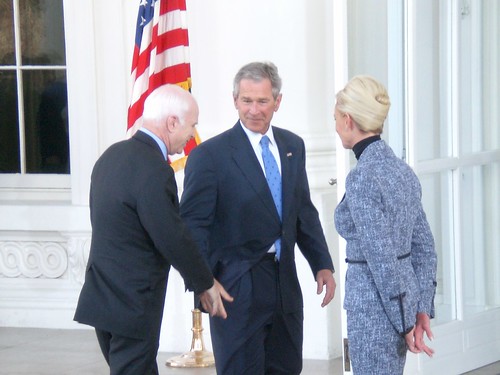Wednesday
May142008
The battle of the biggest budget begins
The House Armed Services Committee began the long and tedious process of marking up the Defense Authorization bill for fiscal 2009. The markup is expected to go on throughout the day. The Chairman Ike Skelton (D-MO), in his opening statement expressed his position that the war in Afghanistan should be the primary focus of the American military efforts in the Middle East. This runs somewhat contrary to statements made by Secretary of Defense Robert Gates when he spoke at the Heritage Foundation in Colorado Springs yesterday, "The risk of overextending the Army is real. But I believe the risk is far greater — to that institution, as well as to our country — if we were to fail in Iraq. That is the war we are in. That is the war we must win."
Skelton also said that the bill offered a pay increase for the military, a greater commitment to fighting weapons of mass destruction, and reforms for the contracting structure within the U.S. Army. He said that the bill addresses the command and control issues that have arisen in Afghanistan and the combined NATO operations there. Ranking Member Dunking Hunter (R-CA) emphasizes future combat systems funding and the need to increase the size of the Army.
The first subcommittee to present their markup and amendments was the Terrorism and Unconventional Threats and Capabilities. The subcommittee chairman Adam Smith (D-WA) said that they have authorized $185 million beyond the president's budget for special operations capabilities. The ranking member of the subcommittee, Mac Thorberry made the most political statement saying that fighting terrorism goes beyond the Armed Services Committee and that the failure to pass FISA in the House and the limits currently being extracted on intelligence officials' interrogation techniques increase, "Our potential vulnerability to new threats..." He spoke out against Nancy Pelosi saying that "no good deed goes unpunished" as she uses Iraq war funding and the Colombia Free Trade Agreement as leverage against President Bush.
Skelton also said that the bill offered a pay increase for the military, a greater commitment to fighting weapons of mass destruction, and reforms for the contracting structure within the U.S. Army. He said that the bill addresses the command and control issues that have arisen in Afghanistan and the combined NATO operations there. Ranking Member Dunking Hunter (R-CA) emphasizes future combat systems funding and the need to increase the size of the Army.
The first subcommittee to present their markup and amendments was the Terrorism and Unconventional Threats and Capabilities. The subcommittee chairman Adam Smith (D-WA) said that they have authorized $185 million beyond the president's budget for special operations capabilities. The ranking member of the subcommittee, Mac Thorberry made the most political statement saying that fighting terrorism goes beyond the Armed Services Committee and that the failure to pass FISA in the House and the limits currently being extracted on intelligence officials' interrogation techniques increase, "Our potential vulnerability to new threats..." He spoke out against Nancy Pelosi saying that "no good deed goes unpunished" as she uses Iraq war funding and the Colombia Free Trade Agreement as leverage against President Bush.




 Wednesday, May 14, 2008 at 11:05AM
Wednesday, May 14, 2008 at 11:05AM


White House Gaggle
Schedule
This morning the president had his normal briefings.
He will be meeting with the Secretary of Treasury, Henry Paulson for a regular update on the economy comments. The office on Community and Faith-Based Initiatives are having a roundtable today to talk about the role that faith-based groups may have in disaster preparedness and emergency response.
When asked if the president had any reaction to reports that Palestinian President Mahmoud Abbas said that he would resign if there is not any meaningful progress in the peace process, Stanzel said that he wasn’t sure if the president had discussed it in private meeting. He reiterated the president’s view that both Abbas and Israeli Prime Minister Ehud Olmert are two men who are committed to peace ad moving the process forward. Stanzel said that the president remains optimistic but that if it were an easy process it would have been resolved already.
The topic of the strategic oil reserve came up and Stanzel said the Congress did pass a bill to halt the fill of the strategic reserve. He said that the president will sign that legislation. While the White House thinks this measure won’t have a meaningful impact Stanzel said that President Bush is not going to stand in the way of it. Because of the legislation the Department Energy has to regularly enter into contracts to sustain the filling of the reserve. Stanzel said that the DOE took the initiative to not enter into new contracts because the legislation passed with such bipartisan support. Stanzel said that he hopes this legislation won’t distract members of Congress from real priorities, like increasing production in an environmentally sensitive way.
On the economy Stanzel said what is important to the White House is the question of what is being done about an economy that is not growing fast enough. The President is not satisfied with the .6% growth of the first half of the year. Stanzel said that the president has confidence in the business tax incentives, and the tax rebates. They are concerned that the Congress don’t pass new tax increase and is focused on action and results. Stanzel said that the White House wants to make sure we strengthen the legislation that oversees Freddie Mac and Fannie Mae and that the administration hopes that Congress can move forward on FHA modernization and GSE reform.